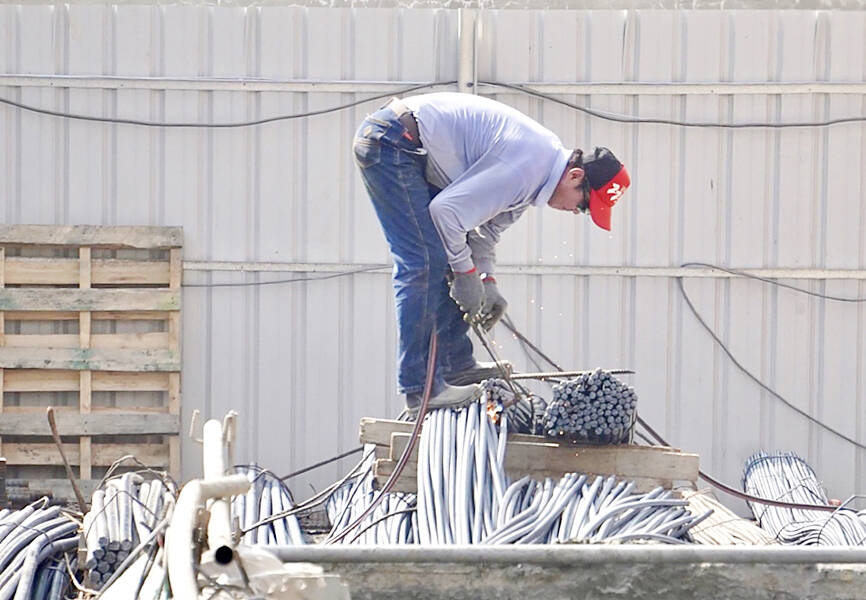The number of workers on official furlough programs rose by more than 500 over the past week as more export-oriented manufacturers introduced unpaid leave programs due to declining orders amid weakening global demand, the Ministry of Labor said yesterday.
The number of workers on furlough climbed from 17,646 on Thursday last week to 18,163, the ministry said.
The manufacturing sector saw a surge in the number of furloughed workers over the past week, Department of Labor Standards and Equal Employment Director Huang Wei-chen (黃維琛) said.

Photo: CNA
One manufacturer in the metal electromechanical component industry placed about 50 workers on unpaid leave over the past week, while one in the textile sector reported another 60 furloughed workers due to a decline in global orders, Huang said.
The number of furloughed workers in the support services industry, which is largely composed of travel agencies, increased by 246 to 7,772 in the week, he said.
However, most employers in the support services industry said they plan to end their furlough programs by the end of this year following the government’s announcement that it would remove the weekly cap on the number of visitors from abroad on Saturday next week and ahead of the Lunar New Year holiday, Huang said.
A major downturn in the number of furloughed workers is expected next month as domestic demand recovers, he added.
The latest data on furloughed workers come as activity in Taiwan’s manufacturing sector remained sluggish for the eighth consecutive month in October, as political and economic uncertainties continued to dent global demand, the Taiwan Institute of Economic Research (TIER, 台灣經濟研究院) said on Wednesday.
The institute said that its composite index for the local manufacturing sector rose by 0.17 points compared with September to 0.97.
This performance put it in the “yellow-blue” range on TIER’s five-tier scale, under which “red” indicates overheating, “yellow-red” fast growth, “green” stable growth, “yellow-blue” sluggish growth and “blue” contraction.
The institute said that a weak New Taiwan dollar, and persistent demand for automobile chips and high-performance computing systems had not fully offset the impact of foreign customers canceling or postponing orders due to changed production plans.
This led to local businesses adjusting their investment and expenditure plans, with Taiwan’s industrial production index, outbound shipments and export orders all declining in October for a second straight month as a result, the Taipei-based institute said.

Taiwanese suppliers to Taiwan Semiconductor Manufacturing Co. (TSMC, 台積電) are expected to follow the contract chipmaker’s step to invest in the US, but their relocation may be seven to eight years away, Minister of Economic Affairs J.W. Kuo (郭智輝) said yesterday. When asked by opposition Chinese Nationalist Party (KMT) Legislator Niu Hsu-ting (牛煦庭) in the legislature about growing concerns that TSMC’s huge investments in the US will prompt its suppliers to follow suit, Kuo said based on the chipmaker’s current limited production volume, it is unlikely to lead its supply chain to go there for now. “Unless TSMC completes its planned six

Intel Corp has named Tasha Chuang (莊蓓瑜) to lead Intel Taiwan in a bid to reinforce relations between the company and its Taiwanese partners. The appointment of Chuang as general manager for Intel Taiwan takes effect on Thursday, the firm said in a statement yesterday. Chuang is to lead her team in Taiwan to pursue product development and sales growth in an effort to reinforce the company’s ties with its partners and clients, Intel said. Chuang was previously in charge of managing Intel’s ties with leading Taiwanese PC brand Asustek Computer Inc (華碩), which included helping Asustek strengthen its global businesses, the company

Power supply and electronic components maker Delta Electronics Inc (台達電) yesterday said second-quarter revenue is expected to surpass the first quarter, which rose 30 percent year-on-year to NT$118.92 billion (US$3.71 billion). Revenue this quarter is likely to grow, as US clients have front-loaded orders ahead of US President Donald Trump’s planned tariffs on Taiwanese goods, Delta chairman Ping Cheng (鄭平) said at an earnings conference in Taipei, referring to the 90-day pause in tariff implementation Trump announced on April 9. While situations in the third and fourth quarters remain unclear, “We will not halt our long-term deployments and do not plan to

The New Taiwan dollar and Taiwanese stocks surged on signs that trade tensions between the world’s top two economies might start easing and as US tech earnings boosted the outlook of the nation’s semiconductor exports. The NT dollar strengthened as much as 3.8 percent versus the US dollar to 30.815, the biggest intraday gain since January 2011, closing at NT$31.064. The benchmark TAIEX jumped 2.73 percent to outperform the region’s equity gauges. Outlook for global trade improved after China said it is assessing possible trade talks with the US, providing a boost for the nation’s currency and shares. As the NT dollar